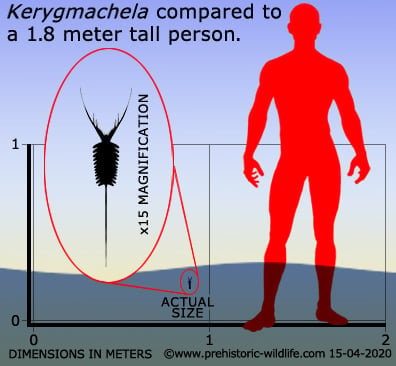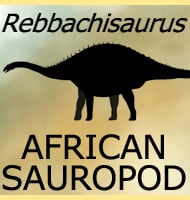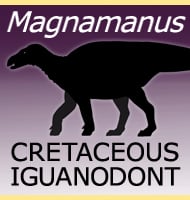In Depth
Kerygmachela was an aquatic arthropod of the Cambrian that is thought to be related to the larger Anomalocaris, hence the placement of Kerygmachela within the Anomalocarididae. The type species name, K. kierkegaardi, is in honour of Soren Kierkegaard, a Danish philosopher.
Kerygmachela had eleven pairs of lateral lobes, out growths that extended from the sides of the main body that appear to have been used for swimming. Although not an especially fast swimmer, Kerygmachela was probably still fast enough to catch its preferred prey items. Like the aforementioned Anomalocaris, Kerygmachela had two frontal limbs, although they appear to have curved to the sides to form a large pincer rather than downwards. These limbs also seem to have large spines that would have been capable of skewering soft bodied prey animals. The mouth of Kerygmachela was between these two limbs so it probably ate as it held its prey in its limbs. Kerygmachela was originally reconstructed with two rearward pointing cerci, however, later studies have shown that there was actually only one. This single cerci was easily as long as the body.
Another similar arthropod that has also been found in the same area as Kerygmachela is Pambdelurion, although it appears to have had quite a different lifestyle.
Further Reading
– A Cambrian gilled lobopod from Greenland – Nature 364 (6439): 709 – Graham E. Budd – 1993. – The morphology and phylogenetic significance of Kerygmachela kierkegaardi Budd (Buen Formation, Lower Cambrian, N Greenland) – Transactions-Royal Society of Edinburgh 89: 249–290 – Graham E. Budd – 1999. – Brain and eyes of Kerygmachela reveal protocerebral ancestry of the panarthropod head. – Nature Communications. 9 (1): 1019. – Tae-Yoon S. Park, Ji-Hoon Kihm, Jusun Woo, Changkun Park, Won Young Lee, M. Paul Smith, David A. T. Harper, Fletcher Young, Arne T. Nielsen & Jakob Vinther – 2018.










